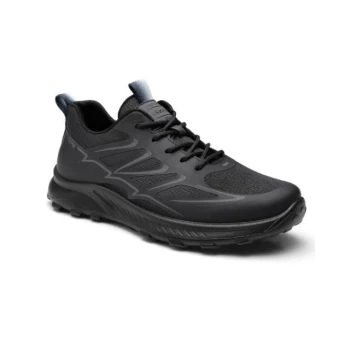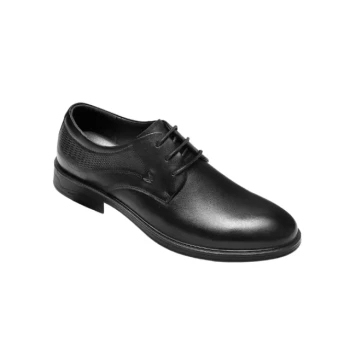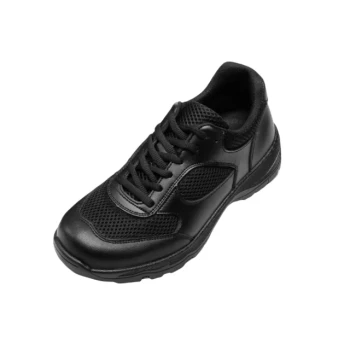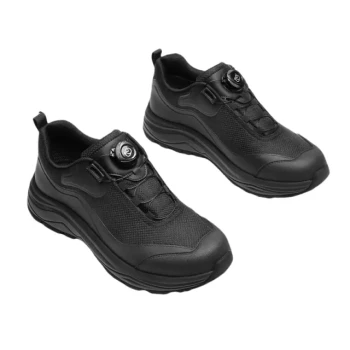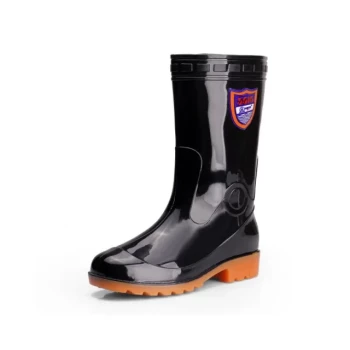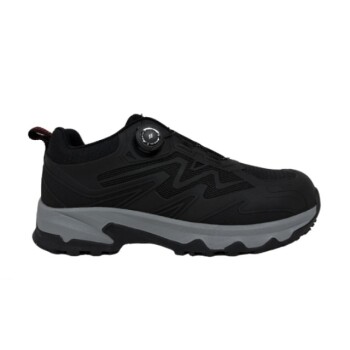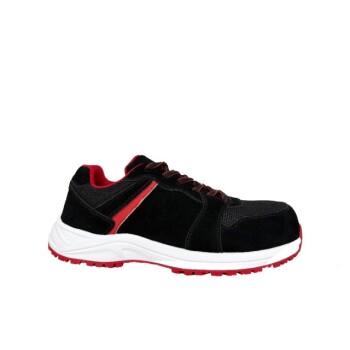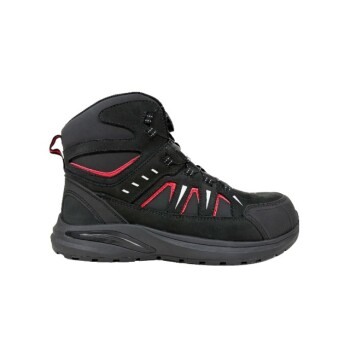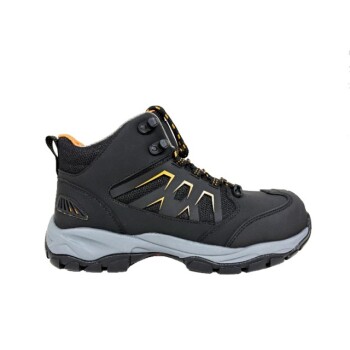From an environmental standpoint, the primary benefits of choosing real leather shoes are rooted in two key principles: the utilization of a byproduct material that would otherwise be waste and the inherent durability of the material, which promotes a longer product lifespan. This combination aims to reduce waste at both the beginning and end of the product's life cycle.
The core environmental argument for real leather rests on its ability to transform a waste stream from the meat industry into a highly durable, long-lasting product, thereby reducing overall consumption and disposal.
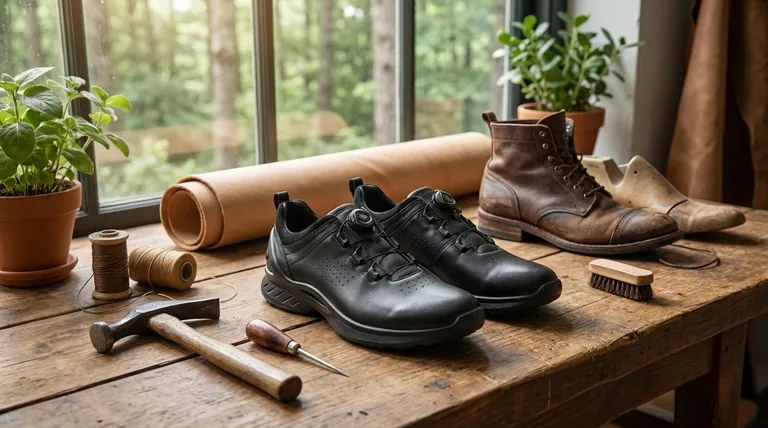
The Byproduct Principle: Preventing Waste
One of the most frequently cited environmental benefits of real leather is its origin as a byproduct. Understanding this context is crucial to evaluating its impact.
Repurposing an Existing Resource
Real leather is made from the hides of animals raised primarily for the meat and dairy industries. These hides would otherwise be considered waste products.
By tanning and transforming these hides into leather, the industry effectively upcycles a material that would likely end up in a landfill, preventing significant waste generation.
The Value Chain Context
The hide represents a very small fraction—often cited as less than 1%—of the total economic value of the animal.
This reinforces the argument that animals are not raised for their hides alone. Leather production utilizes an available resource from a pre-existing industry, rather than creating a new demand for animal agriculture.
Durability as a Core Sustainability Metric
Beyond its source material, the physical properties of leather contribute directly to its sustainability profile, primarily through longevity.
Extending Product Lifespan
Well-made leather shoes are known for their durability and can last for many years, often outperforming synthetic alternatives. This resilience reduces the need for frequent replacements.
Many leather goods can also be repaired and restored, further extending their usable life and keeping them out of the waste stream.
Reducing Consumption and Waste
By lasting longer, a single pair of leather shoes can take the place of multiple pairs of less durable footwear.
This reduction in the frequency of replacement directly translates to lower overall resource consumption, energy usage, and waste generation over time.
Critical Caveats to Consider
While the benefits of using a durable byproduct are clear, a complete environmental assessment requires acknowledging the complexities and trade-offs involved.
The Impact of Tanning
The process of turning raw hide into finished leather, known as tanning, can be resource-intensive. Traditional methods may involve chemicals and significant water usage, which have their own environmental footprint. Consumers should look for leather tanned using more modern, regulated, and environmentally conscious processes.
The Link to the Meat Industry
Although leather is a byproduct, its production is inextricably linked to the meat industry. The overall environmental impact of animal agriculture—including land use, water consumption, and methane emissions—is a significant part of the larger conversation.
End-of-Life Biodegradability
Real leather is a natural material that can biodegrade, but the rate at which it does depends heavily on the tanning and finishing processes used. Some modern treatments can inhibit this process, making the product's final disposal a relevant factor.
Making the Right Choice for Your Goal
Evaluating any material requires weighing its pros and cons against your personal priorities.
- If your primary focus is utilizing waste streams: Real leather offers a compelling solution by converting hides from the meat industry into a valuable and useful material.
- If your primary focus is reducing long-term consumption: High-quality, durable leather footwear is an excellent choice, as its longevity minimizes the cycle of buying and discarding.
- If your primary focus is avoiding animal products entirely: You will naturally seek non-leather alternatives, but it's important to apply the same durability and lifecycle analysis to those materials as well.
Ultimately, choosing a truly sustainable product means prioritizing quality, craftsmanship, and a longer lifespan, regardless of the material.
Summary Table:
| Benefit | Key Takeaway |
|---|---|
| Byproduct Utilization | Upcycles hides from the meat industry, preventing landfill waste. |
| Durability & Longevity | Lasts for years, reducing the need for frequent replacements. |
| Reduced Consumption | One durable pair replaces multiple pairs of less durable footwear. |
| End-of-Life | A natural material that can biodegrade, depending on the tanning process. |
As a large-scale manufacturer, 3515 produces a comprehensive range of durable, high-quality leather footwear for distributors, brand owners, and bulk clients. We specialize in crafting long-lasting shoes and boots that align with sustainable principles by maximizing material value and product lifespan. Let us help you build a product line that meets both your business goals and environmental values.
Contact us today to discuss your footwear needs and explore our manufacturing capabilities.
Visual Guide
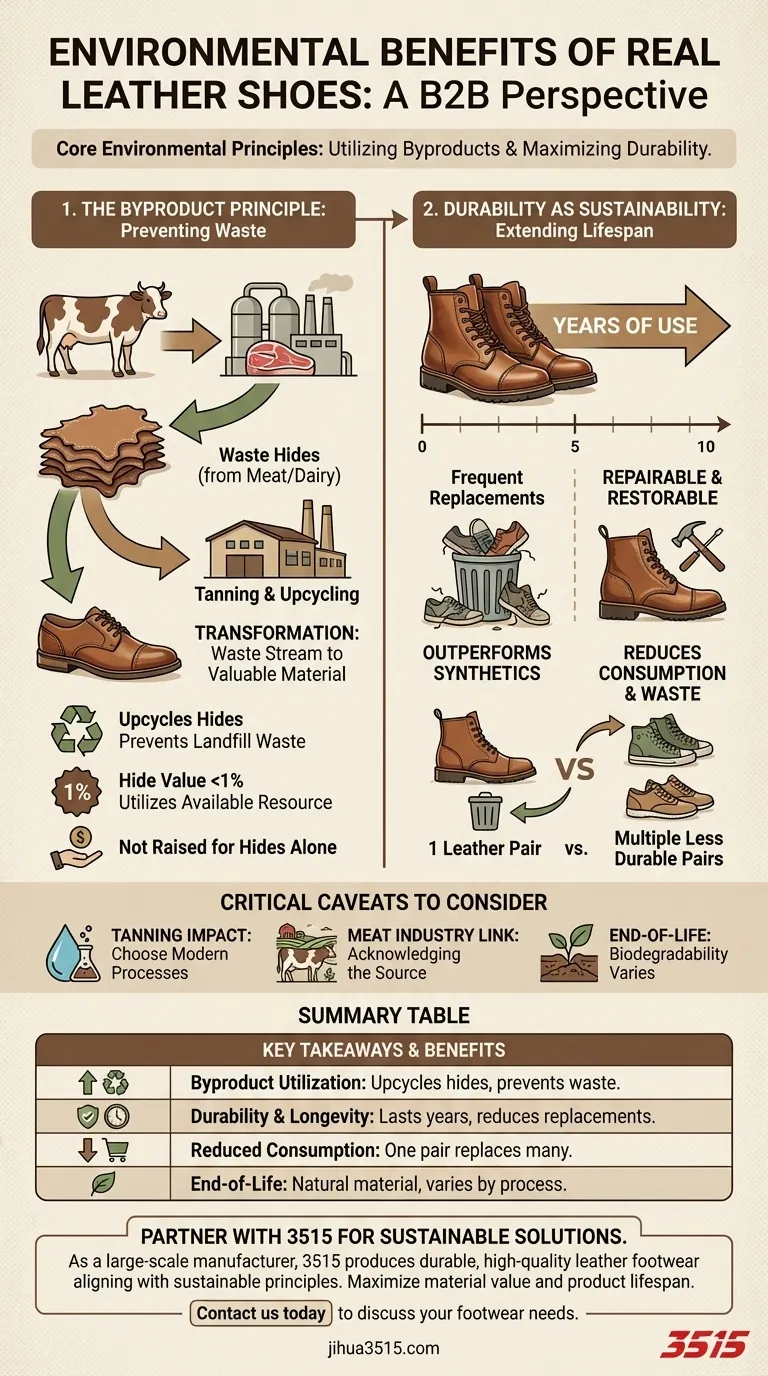
Related Products
- Wholesale Comfort Leather Business Shoes with Dial Lacing System
- Wholesale Women's Leather Derby Shoes Custom Factory Production
- Custom OEM Training Shoes Wholesale Manufacturer Durable & Breathable
- Wholesale Leather Derby Dress Shoes Custom Manufacturer for Brands
- Durable Leather Safety Boots for Wholesale & Custom OEM Manufacturing
People Also Ask
- What are the key features of high-quality leather in shoes? Invest in Durability and a Perfect Fit
- How can crocodile-inspired leather dress shoes make a statement at formal events? Command Attention with Bold Style
- How does high-performance professional footwear serve as an ergonomic intervention to reduce physiological fatigue in high-intensity work environments? Boost Performance & Safety!
- How can one identify authentic leather footwear? A Guide to Spotting Genuine vs. Fake
- What should consumers look for to avoid misleading claims about leather quality? A Guide to Identifying Genuine Quality


